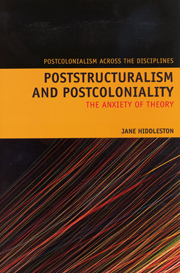Introduction
Summary
The interpenetration of poststructuralism and postcoloniality has been a subject of extensive and heated debate. On one level, enough commentators have stressed the connection between deconstructive theory and a contemporary scepticism towards Western ethnocentrism for the question of their imbrication to be unavoidable. Most famously, Robert Young's White Mythologies, and later his monumental Postcolonialism, show how the works of philosophers such as Lévi-Strauss, Foucault and Derrida were shaped by the end of imperialism and by a generalised expression of doubt concerning European hegemony. Young provocatively asserts that the inauguration of deconstruction was indeed not May 1968 but the Algerian war of independence. And, on a more general level, notions of dissemination and supplementarity are intrinsically bound up with the displacement of the metaphysics of the West. In addition, major postcolonial thinkers such as Homi Bhabha and Gayatri Spivak explicitly acknowledge their debt to poststructuralism. Bhabha questions the coherence of the nation-state using the notion of ‘dissemiNation’, and Spivak conceptualises the subaltern with reference to Derrida's ‘appeal’ or ‘call’ to the ‘quite-other’. For both thinkers, the poststructuralist undermining of hegemonic discourses, and attention to the ‘play’ of language, help to conceptualise also the cultural otherness that is the ‘supplement’ to the (neo-)imperialist West. Simon Gikandi neatly summarises this interweaving, and argues that, for better or for worse, postcolonialism itself ‘emerged within the larger institutions of European, especially French, theory after structuralism. In this respect, postcolonial discourse is unthinkable without poststructuralist theory.’
- Type
- Chapter
- Information
- Poststructuralism and PostcolonialityThe Anxiety of Theory, pp. 1 - 18Publisher: Liverpool University PressPrint publication year: 2010
- 2
- Cited by



